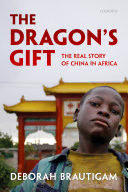
The Dragon's Gift: The Real Story of China in Africa PDF
02009·3.812 MB·English
Most books are stored in the elastic cloud where traffic is expensive. For this reason, we have a limit on daily download.
Preview The Dragon's Gift: The Real Story of China in Africa
Description:
Several years ago, China's foreign aid programme emerged from the shadows where it had been operating for more than five decades, igniting a debate within the media and quickly gaining a prominence on the agendas of the major players in the aid debate. This debate and concerns about China'srole as a donor have, to date, largely operated in the dark because few have more than a smattering of information with which to assess the risks and opportunities presented by China's aid and economic engagement in Africa. This is exacerbated by the Chinese tradition of secrecy which continues tofuel misunderstandings, rumor, and speculation about their aid programme.This book analyzes China's aid program and its connection to the broad range of state-sponsored development activities the Chinese call "economic cooperation." It explains what the Chinese are doing in their developmental state-sponsored economic engagement in Africa, how they do it, and why theyare doing it. Based on fieldwork in Africa and China, and dozens of interviews in Washington, Paris, and London, this book fills an important gap. It reviews the debate over the Chinese development model, the "Beijing Consensus", and its appropriateness for other developing countries, and theresponse by leaders of developing countries to China's "strategic engagement." The book frames China's aid as a product of China's own economic and political transitions, and outlines the Chinese aid system in the past and today: its structure in Beijing, the provinces, and overseas. Chinese aidon the ground - including decision-making about projects, aid implementation, monitoring and evaluation, and the effectiveness of Chinese aid - are all central themes in the book.
See more
The list of books you might like
Most books are stored in the elastic cloud where traffic is expensive. For this reason, we have a limit on daily download.
